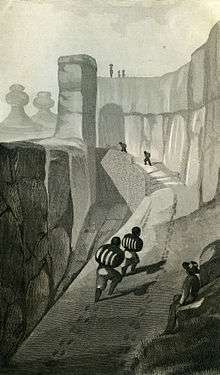James William Abert
| James William Abert | |
|---|---|
 | |
| Born |
November 18, 1820 Mount Holly Township, New Jersey |
| Died |
August 10, 1897 (aged 76) Newport, Kentucky |
| Buried | Evergreen Cemetery (Southgate, Kentucky) |
| Allegiance |
|
| Service/branch |
|
| Years of service | 1842–1864 |
| Rank |
Major Brevet Lieutenant Colonel |
| Unit | Corps of Topographical Engineers |

James William Abert (November 18, 1820 – August 10, 1897) was an American soldier, explorer, bird collector and topographical artist.
Early life
Abert, the son of John James Abert,[1] was born in Mount Holly Township, New Jersey, and graduated from West Point in 1842.
Military career
Abert joined the Corps of Topographical Engineers, which was headed by his father,[1] in 1843. He joined several expeditions into the west, including John Frémont's third expedition, and illustrated these expeditions reports with his sketches. He was also put in charge of a detachment to map the Canadian River. In 1846 he was sent west to join the army of General Kearney in the war against Mexico, returning to Fort Leavenworth in the following year. It was during this time that he acquired a new species of bird, which was named the Abert's towhee in his honour. During the American Civil War, he served on the staffs of Robert Patterson, Nathaniel P. Banks and Quincy A. Gillmore. He was wounded during the Maryland Campaign, and retired from the Army in June 1864.
Later life
After the Civil War, he became a professor of English literature, mathematics and drawing at the University of Missouri. His original watercolors are now privately owned.
References
- Who's Who in America, Historical Volume, 1607-1896. Chicago: Marquis Who's Who, 1967.
Further reading
- The Journal of the Cincinnati Society of Natural History. The Society. 1884.
- "John James Abert, to John James Audubon (Hitherto Unpublished Letters)". The Auk. American Ornithologists' Union. 22. 1905.
- Abert, James (1979). Program evaluation at HEW: research versus reality, Part 1. M. Dekker. ISBN 0-8247-6710-1.
- Minge, Ward (1976). Acoma: pueblo in the sky. University of New Mexico Press. ISBN 0-8263-0417-6.
External links
- Works by or about James William Abert at Internet Archive
- Dianna Everett, " Abert Expedition." Encyclopedia of Oklahoma History and Culture.
- Career Profile